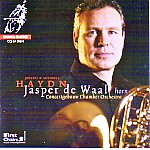Start with the sound; the solo horn is notoriously difficult to capture and balance, but the engineering here is gorgeously natural, warm, and wholly flattering to both the soloist and the larger ensemble (in stereo and SACD multichannel formats). Jasper de Waal has an attractive tone, full but not brassy, and he negotiates the difficult leaps and rapid passage-work with utter security. Henk Rubingh and the Concertgebouw Chamber Orchestra accompany crisply and affectionately. However, the real treat on this program (for me at least) consists of two chamber works.
Michael Haydn’s Romance for Horn and String Quartet consists of a somewhat simplified version of the slow movement of Mozart’s Horn Concerto K. 447, to which Haydn has added a new accompaniment. If you know the original, this is quite fun. Joseph Haydn’s Divertimento a Tre for horn, violin, and cello is a theme and variations plus finale dating from 1767. It’s a brilliant, original, and highly entertaining bit of early Haydn, and it’s virtually unknown. So what are you waiting for? [4/30/2010]
































